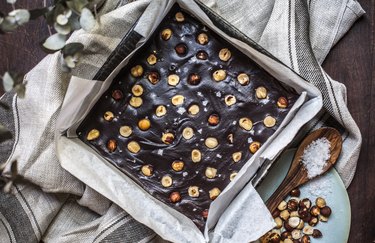
Should you continue to use your favorite rusty pan or rusted muffin tin, or is it unsafe? Whether it is a nonstick pan or a cast-iron skillet, caring properly for your cookware will help prevent rust and the potential health consequences of ingesting rust.
Tip
Rust, which is also known as iron oxide, forms from iron being exposed to oxygen. Water speeds up the rusting process, so to prevent rusting on your cookware, dry it off thoroughly after washing.
Video of the Day
Is Rust Bad For You?
A little rust on your favorite muffin tin or pan doesn't look great, but can it actually be bad for your health if you go ahead and use it? According to the Centers for Disease Control and Prevention (CDC), breathing in high levels of iron oxide dust can cause breathing and lung issues. Workers who were exposed to iron oxide dust for many years developed lung issues; therefore, the CDC developed a safe limit to keep these workers safe. A little rust on your cookware, however, isn't the same as ingesting high quantities of rust.
Video of the Day
The U.S. Food and Drug Administration (FDA) lists synthetic iron oxide as a safe color additive, and it is used in things like cosmetics and chewing gum, while the Environmental Protection Agency sets limits on iron in drinking water based on the color, odor and taste, versus a specific amount or concentration in the water.
What is the bottom line of the health consequences of ingesting rust? University of California Berkeley looked at rust in drinking water and said that ingesting some rust is not a health concern, unless you have a rare disorder called hemochromatosis, which causes iron accumulation in your organs.
Preventing Rust on Cookware
Even though the health consequences of ingesting rust are minimal, it is probably still a good idea to either clean or get rid of that really rusted muffin tin or rusty pan.
According to Consumer Reports, the way you clean and care for your cookware depends on the type of material it is made from. Nonstick pans, as well as aluminum or stainless steel pans, should all be cleaned with hot water and dishwashing soap. For the nonstick pans, use plastic or nylon scrapers to get rid of stuck-on food to avoid damaging the lining of the pan. Do not wash in the dishwasher or use steel wool on them, and use plastic or wood utensils to avoid scratching the surface.
Copper pans should also be washed with hot water and dishwashing soap. Do not scour these types of pans, as it could ruin the lining. You can polish the outside of the pans with vinegar and salt or a copper cleaner.
Cleaning Rust on Cast Iron
Cast-iron pans are prone to rusting. Consumer Reports recommends you wash it with hot water and dishwashing soap and dry it very well. After drying off, you may want to let it sit out before putting it in the cupboard to allow it to continue drying. Do not use a dishwasher for cast iron pans.
If you do see rust forming on your cast iron pan, you can scour the spots with steel wool and then apply vegetable oil. The vegetable oil will keep the cast iron pan seasoned appropriately.
What is the Healthiest Cookware?
Nonstick cookware is usually resistant to rust; however, you do need to be aware of the type of coating that is used. An October 2017 study in Environmental Science and Pollution Research International said to avoid nonstick pans that have a PTFE or PFOA coating because they release toxic gases. If you have nonstick pans from before 2013, throw them out since they are coated with PFOA. For nonstick pans in general, don't use them with really high heat and clean them according to the above guidelines. Throw away any that are scratched.
Stainless steel and cast-iron pans are both good alternatives to nonstick cookware. Look for stainless steel pans without aluminum, as a September 2018 study in Journal of Environmental Health Sciences and Engineering showed that aluminum did leach into boiled water.
The only downside to cast-iron pans is they are heavy (but they are good for those biceps!) and have a tendency to rust easily, so keep them clean and dry.
- Cornell Center for Materials Research: "What is Rust?"
- U.S. Food and Drug Administration: "Color Additive Status List"
- Environmental Protection Agency: "Drinking Water Regulations and Contaminants"
- University of California Berkeley: "Rusty Water"
- Consumer Reports: "How to Care for Your New Cookware"
- Environmental Science and Pollution Research International: "PTFE-coated non-stick cookware and toxicity concerns: a perspective"
- Journal of Environmental Health Sciences and Engineering: "Cytotoxicity and genotoxicity effects of water boiled in aluminum vessels on Allium cepa root tip cells""
- Centers for Disease Control and Prevention: "Iron Oxide (Dust)"